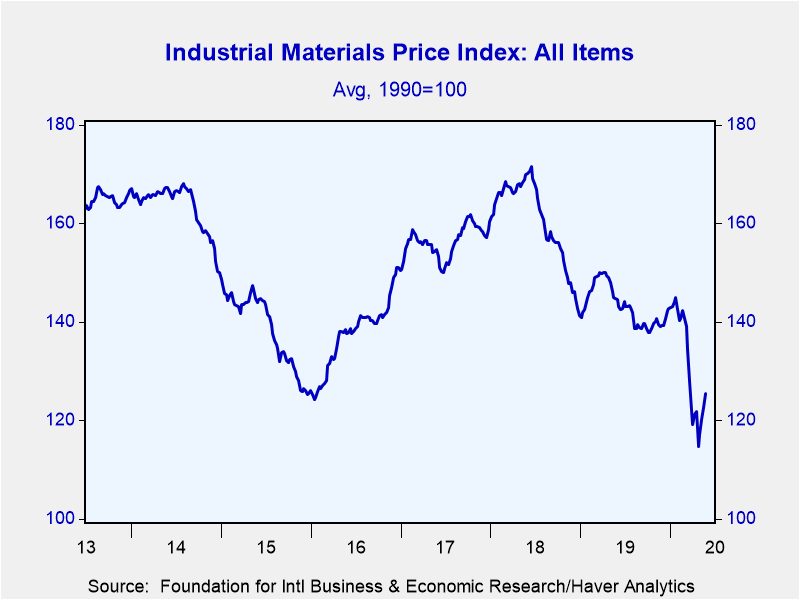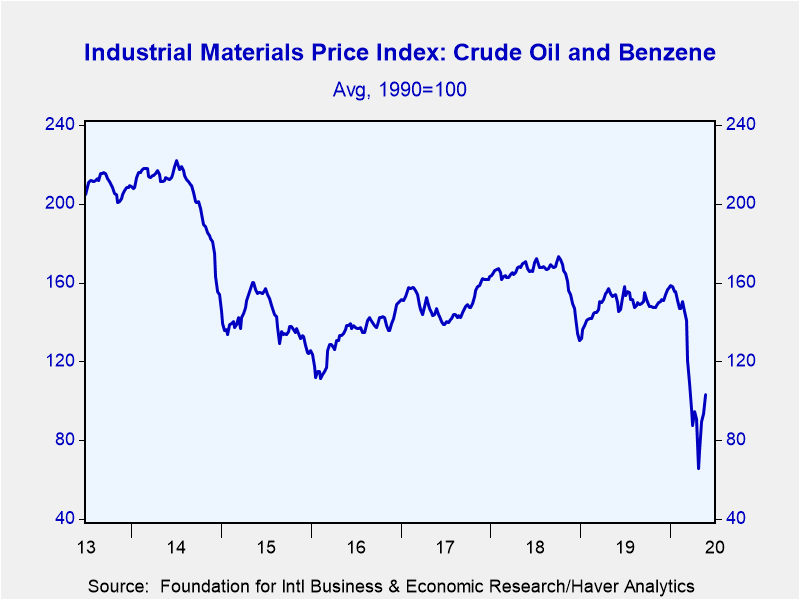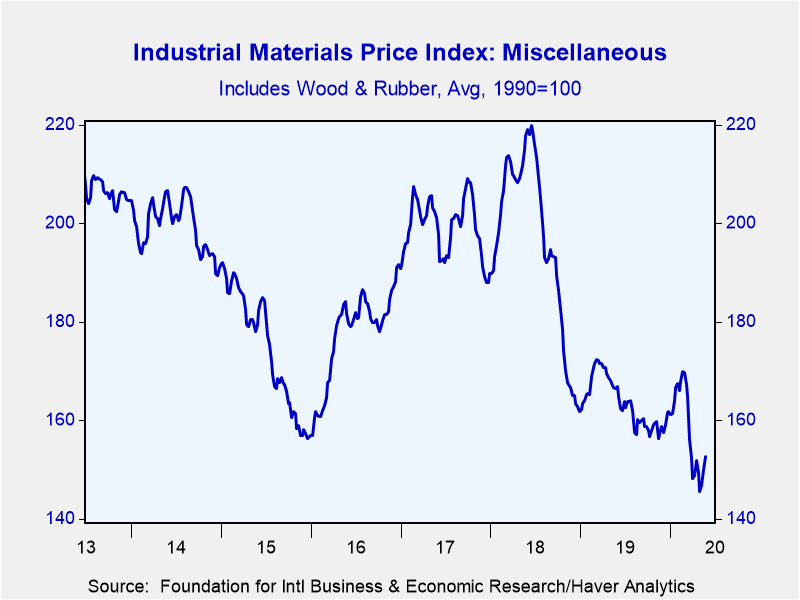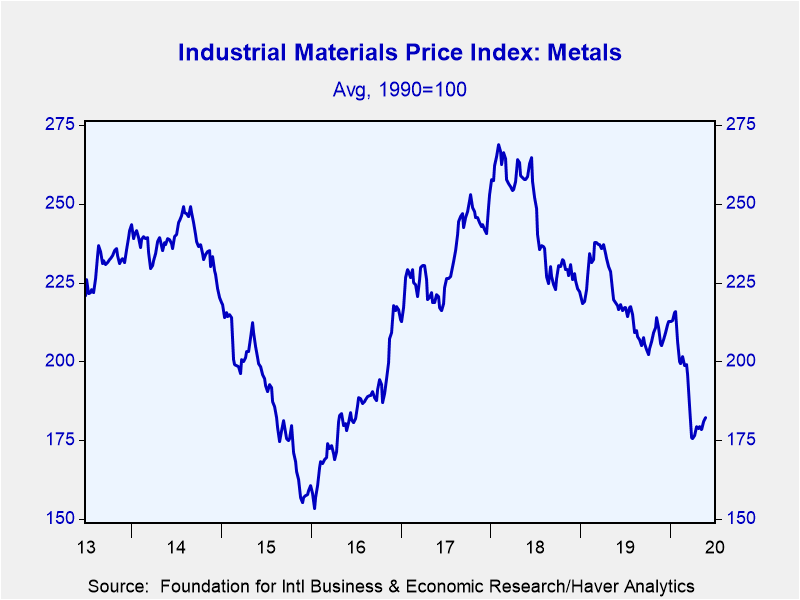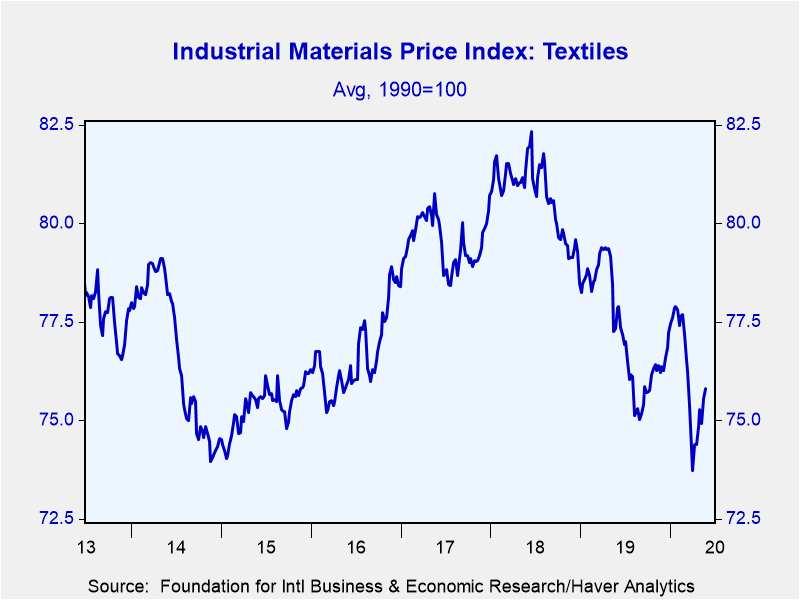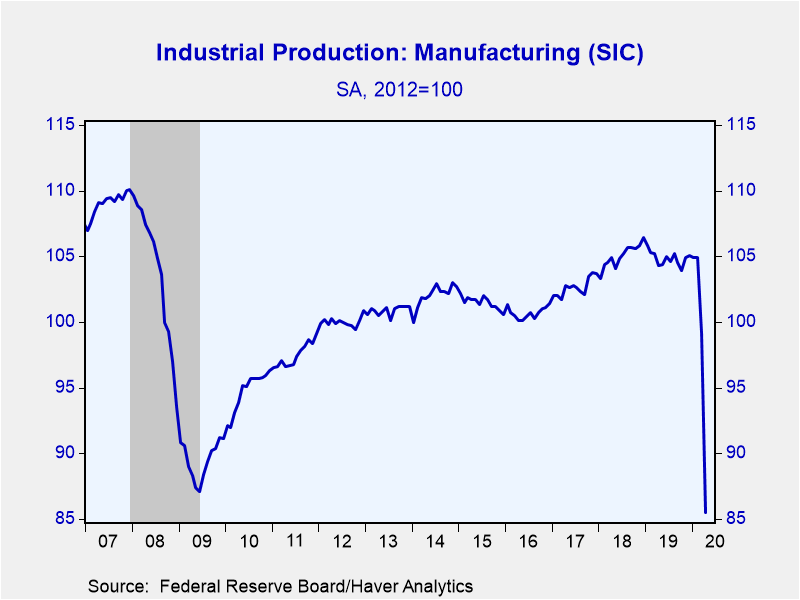 Global| May 22 2020
Global| May 22 2020FIBER: Industrial Commodity Price Rebound Led by Petroleum
by:Tom Moeller
|in:Economy in Brief
Summary
• Oil prices rise as lockdown eases. • Metals prices improve. • Plywood prices surge. The Industrial Materials Price Index from the Foundation for International Business and Economic Research (FIBER) jumped 9.4% during the four weeks [...]
• Oil prices rise as lockdown eases.
• Metals prices improve.
• Plywood prices surge.
The Industrial Materials Price Index from the Foundation for International Business and Economic Research (FIBER) jumped 9.4% during the four weeks ended today. The price index has rebounded to the highest level in two months after falling to an 11-year low. Prices remained 13.3% lower than twelve months earlier.
Strength in the crude oil & benzene group led the price rebound, up 57.2% in the last four weeks. WTI crude oil prices surged to $32.43 per barrel, up from $11.66 four weeks earlier. Prices remained down from a high of $61.92 in the first week of January. Prices of the petro-chemical benzene rose 7.4% in the last four weeks (-55.3% y/y). Excluding crude oil, industrial commodity prices rose 1.9% during the last four weeks but were off 10.6% over the last year.
Prices in the miscellaneous group increased 2.1% in the last month as the cost of tallow (used for food preparation) surged 20.7% (25.0% y/y). Framing lumber prices rose 8.0% but the cost of plywood held steady (-7.7 y/y). Natural rubber prices also were unchanged over the last month. Prices in the metals group improved 2.0% during the last four weeks as the cost of copper scrap rose 3.7% and zinc prices increased 5.0% (-26.4% y/y). Steel scrap prices improved 2.0% but aluminum prices eased 0.5%. Lead prices slipped 0.8% (-9.1% y/y) in the last four weeks. Rising by 1.3% were prices in the textile group. Cotton prices surged 8.3% but the cost of burlap (used for sacks, bags & gardening) held steady (1.2% y/y).
The deepening factory sector recession likely will keep industrial materials prices weak. Industrial output plummeted 13.7% in April (-18.0% y/y) as the effects of the coronavirus spread. During the last ten years, there has been a 54% correlation between the y/y change in industrial commodity prices and the y/y change in factory sector production.
Commodity price data can be found in Haver's DAILY, WEEKLY, USECON and CMDTY databases.
An Unemployment Crisis after the Onset of COVID-19 from the Federal Reserve Bank of San Francisco is available here.
| FIBER Industrial Materials Price Index (%) | 1-Mth | 3-Mth | 6-Mth | 12-Mth | 2019 | 2018 | 2017 |
|---|---|---|---|---|---|---|---|
| All Items | 9.4 | -11.8 | -9.8 | -13.3 | 1.1 | -12.0 | 6.7 |
| Excluding Crude Oil | 1.9 | -9.8 | -7.2 | -10.6 | -0.6 | -11.1 | 4.9 |
| Textiles | 1.3 | -2.4 | -0.5 | -2.0 | -1.6 | -2.8 | 3.0 |
| Cotton (cents per pound) | 8.3 | -15.4 | -10.7 | -12.5 | -6.6 | -9.2 | 9.8 |
| Metals | 2.0 | -9.7 | -11.5 | -16.7 | -4.3 | -12.2 | 18.6 |
| Aluminum ($ per metric ton) | -0.5 | -13.5 | -16.5 | -17.7 | -6.5 | -12.7 | 26.0 |
| Copper Scrap (cents per pound) | 3.7 | -8.0 | -9.2 | -11.2 | 3.5 | -16.1 | 29.3 |
| Steel Scrap ($ per ton) | 2.0 | -8.2 | -4.6 | -16.6 | -0.8 | 2.3 | 16.8 |
| Crude Oil & Benzene | 57.2 | -31.2 | -31.3 | -32.8 | 20.2 | -20.0 | 8.1 |
| Crude Oil (WTI, $ per Barrel) | 178.1 | -38.5 | -43.2 | -47.5 | 35.5 | -24.4 | 10.9 |
| Miscellaneous | 2.1 | -10.2 | -3.5 | -8.3 | -0.0 | -14.8 | -0.5 |
| Framing Lumber ($ per 1000 board ft.) | 8.0 | -22.6 | -13.2 | 1.2 | 22.6 | -23.1 | 20.0 |
| Natural Rubber (cents per pound) | 0.0 | -6.8 | -3.1 | -16.7 | 10.7 | -4.1 | -29.6 |
Tom Moeller
AuthorMore in Author Profile »Prior to joining Haver Analytics in 2000, Mr. Moeller worked as the Economist at Chancellor Capital Management from 1985 to 1999. There, he developed comprehensive economic forecasts and interpreted economic data for equity and fixed income portfolio managers. Also at Chancellor, Mr. Moeller worked as an equity analyst and was responsible for researching and rating companies in the economically sensitive automobile and housing industries for investment in Chancellor’s equity portfolio. Prior to joining Chancellor, Mr. Moeller was an Economist at Citibank from 1979 to 1984. He also analyzed pricing behavior in the metals industry for the Council on Wage and Price Stability in Washington, D.C. In 1999, Mr. Moeller received the award for most accurate forecast from the Forecasters' Club of New York. From 1990 to 1992 he was President of the New York Association for Business Economists. Mr. Moeller earned an M.B.A. in Finance from Fordham University, where he graduated in 1987. He holds a Bachelor of Arts in Economics from George Washington University.
More Economy in Brief
 Global| Feb 05 2026
Global| Feb 05 2026Charts of the Week: Balanced Policy, Resilient Data and AI Narratives
by:Andrew Cates


